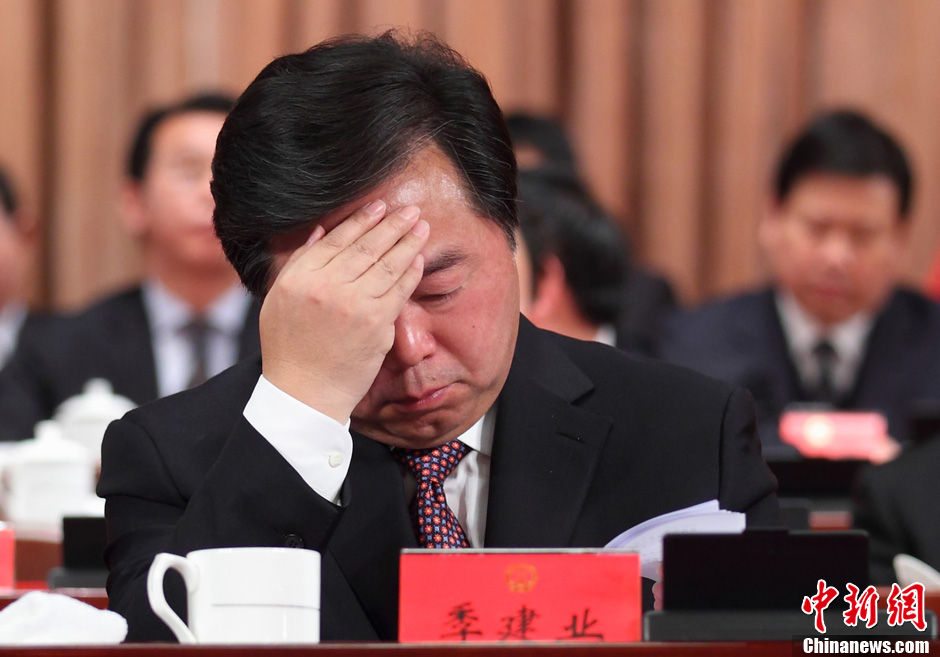The Chinese official's doctorate in vanity
china.org.cn / chinagate.cn by Wu Jin, March 25, 2014 Adjust font size:
|
|
| Ji Jianye, former mayor of Nanjing, capital of Jiangsu Province, is a doctorate student graduating in 2006 from Suzhou University. He was taken away by Central Commission for Discipline Inspection of the Communist Party of China (CPC) in 2013 and soon after got dismissed from the Party. [CNS photo] |
Luxurious watches and expensive overseas trips are simply not enough for some Chinese officials to flaunt their privileges. Beneath their seemingly burning desire for prestige, comes the trading in of academic glory for ivory towers.
One fifth of the 60 corrupt officials pulled out after the 18th National Congress of the Communist Party of China (CPC) in Nov. 2012, held doctoral degrees. This figure may seem like nothing special, unless people start checking how they actually became PhDs.
Ji Jianye, former mayor of Nanjing, capital of Jiangsu Province, was a doctorate student graduating in 2006 from Suzhou University. He was taken away by Central Commission for Discipline Inspection of the Communist Party of China (CPC) in 2013 and soon after got dismissed from the Party. Yet as early as 2007, Ji was subjected to a barrage of online criticism as he was accused of committing plagiarism in his dissertation.
Despite Ji's denial, he was later found trying to bribe a scholar with the sum of 200,000 yuan (US$32,232) to coax him into dropping the accusations. After Ji's fall from grace, his dissertation was not only found to contain plagiarism, but also to have been written by a ghostwriter.
Shen Peiping, former deputy governor of Yunnan Province, attained his doctorate degree in Natural Geography from Beijing Normal University in Jun. 2007, though his previous degrees were just a bachelor in Chinese from Yunnan Education College (1986 to 1988) and a part-time master of Economic Management from the Party School of the Central Committee of the CPC (1999-2002).
Despite the irrelevancy of his previous majors, Shen was hired as a part-time professor at the School of Resources with Beijing Normal University only five months after he had been granted his PhD. Shen was investigated by the Party's Central Commission of Discipline Inspection in Mar. 2014, and his academic authenticity was also questioned.
Neither Ji nor Shen can parallel Wang Lijun who almost excelled at gaining academic ranks. The former Chongqing mayor had only finished junior school when he was transferred to civilian work from being a soldier. He obtained diplomas from both a polytechnic school and junior college through self-study. Yet over the following decade, he attained a number of titles such as part-time professor, master advisor and doctoral mentor, from an overall 29 universities and higher educational institutes.
In 2007, Wang started to study for a part-time doctorate at Dalian Maritime University. However, right that year, he was hired as master advisor at the Postgraduate School of Law with the university. In Feb. 2012, Wang astonished the world by seeking asylum at the U.S. Consulate in Chengdu, which later involved former Chongqing Party Secretary Bo Xilai. In Sep. 2012, Wang was sentenced to 15 years in jail for embezzlement, abuse of power and attempted defection.
According to Time Weekly, the government had recovered 15,000 false diplomas among officials above county level from 2002 to 2004. Yet the figure continues to rise as the tightened anti-corruption campaign, installed after the 18th CPC National Congress, has discovered more questionable academic backgrounds of government officials.
Some scholars also slashed the part-time doctorate system designed for officials who can have easy access to the higher academic ranks which the powerless grassroots can only attain via considerable efforts. "Having worked in university, I know exactly how difficult it is for a student to obtain a degree," said Zhan Jiang, professor at the Center of International Communication Studies with Beijing Foreign Studies University.
According to Zhan, one 26-year-old roommate died when studying for his master's degree in the second year, leaving behind his wife and a child no more than one year old. When Zhan himself was studying for his doctoral degree, he witnessed the breakdown of one of his most brilliant classmates. "The saddest case I have so far heard of, was a doctorate candidate at a university in Shanghai collapsing next to his computer the night before completing his dissertation," Zhan wrote in his blog, "Has Ji ever spent a day studying as hard as [the abovementioned students]? Then, why should there be a pile of diplomas glistening beside him?"
According to Lu Qun, deputy director of the Corruption Prevention Office with the Party's Discipline Inspection Commission in Henan Province, very few officials apply for the doctorates solely for academic purposes. "If you do want to be a scholar, then you have to resign [from the government] and take the time to be in academia," Lu said.
Zhan believes most of the officials applying for the doctorates simply do so for personal gain. "Although a scholastic rank like doctorate may not bring them an immediate promotion, the officials would net the interests as long as they could find the possibility." According to Time Weekly, many officials would give universities more ease in getting funds if they are granted with academic ranks there.
Ji was a member of the school board at Suzhou University. The title gave him considerable priorities, such as recommending students to the university. Meanwhile, the university was privileged to get programs from Ji when he was the Party secretary of Yangzhou, Jiangsu Province, in 2006.
"We hope it is a win-win cooperation in local economic construction," said Wang Rongping, the then-standing deputy mayor of Yangzhou City, Jiangsu Province, as he welcomed the school board from Suzhou University, Time Weekly reported.



